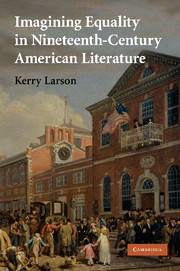5 - Transcending friendships
Published online by Cambridge University Press: 04 May 2010
Summary
Ralph Waldo Emerson is American culture's evangelist of equality. Finding established religion corrupt, he saw in supposedly secular developments such as egalitarianism and a newfound demand for inner worth a more authentically religious impulse. The good news he brings is that a permanent inequality of the spirit is an impossibility, that, somewhat in the manner of contemporaries like Douglass or Walker, equality is a reality whose denial leads to error and mystification. In his writings the mere invocation of equality is a source of wonder. What the genius of Plato may have thought or the legendary saint may have felt is really of secondary consequence for the reader who can see that “what Plato has thought, he may think; what a saint has felt, he may feel.” Conveyed with all the fervor of a conversion experience, such epiphanies appear repeatedly in Essays: First Series (1841), arguably Emerson's major work, the volume whose themes would set the pattern for the rest of his writing career. If Emerson can be said to have invented a religion of democracy, then its central tenet and inspiration is the summoning of an equality in the form of a radical likeness connecting each to all.
But if equality is a source of inspiration, what exactly does it inspire? For Emerson, as for almost everybody then and since, the answer is obvious: it inspires self-reliance. If I can think what Plato thought then there's no reason why I should defer to Plato's opinion.
- Type
- Chapter
- Information
- Imagining Equality in Nineteenth-Century American Literature , pp. 143 - 167Publisher: Cambridge University PressPrint publication year: 2008



